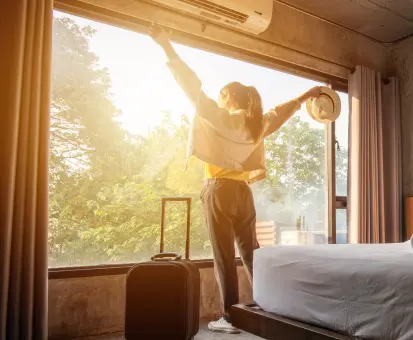Are you toying with the idea of turning that spare room, beach condo, or mountain cabin into a money-making getaway?
The good news is, you don’t need a mansion or a marketing degree. But you do need a game plan. Because listing your place is the easy part. The real work in a successful vacation rental is in the details.
Think zoning, pricing, guest experience, cleaning schedules, and all the little things that turn a one-time booking into repeat income.
Ready to open the (virtual) door to a whole new way of earning? This guide walks you through the steps to starting a vacation rental business so you can launch with confidence, avoid common pitfalls, and start earning from day one.
How to Start Up a Vacation Rental Business
Starting a vacation rental business might seem as simple as listing a property online, but you need a solid foundation to do it well (and profitably).
Market Research
Before you buy furniture or set up a listing, take a step back and look at the big picture. Is there demand in the area you’re considering? Market research helps you answer that.
Start identifying locations with consistent tourist traffic, seasonal appeal, or local events that draw visitors.
Are people visiting year-round, or is it seasonal? What kind of travelers come through? Are they families, couples, or digital nomads? The answers will influence everything from property setup to pricing.
Next, study your competition. Browse Airbnb, Vrbo, and Booking.com for listings in your target area. Pay attention to:
- Occupancy rates and availability calendars
- Average nightly prices
- Types of properties (e.g., entire home vs. private room)
- Guest reviews (what are hosts doing well or poorly?)
You can use data analytics platforms like AirDNA or Mashvisor to get data on occupancy rates, nightly pricing, and revenue potential.
Choosing Your Model
The deeper you go into learning about how to start a vacation rental business, the more familiar you’ll get with the different business models.
For example, some people rent out their own property. Others manage listings for people who don’t have the time or interest. Your model depends on your assets, your risk tolerance, and how hands-on you want to be.
Here are four main options:
- Own-property hosting: You list a space you already own, whether it’s your home, a second property, or even just a spare room. This is the most direct path but also carries the most risk (property upkeep, guest damage, etc.). That said, the earning potential can be significant if the location is right and the setup is solid.
- Co-hosting: Don’t own a property? No problem. As a co-host, you manage bookings, messaging, cleanings, and guest experiences on behalf of another property owner. You earn a percentage (often 10–30%) without taking on the full financial risk of ownership. It’s a great entry point if you’re detail-oriented and have strong communication skills.
- Vacation rental management: This is co-hosting, scaled up. Property managers often handle multiple listings and offer more comprehensive services, like dynamic pricing, maintenance coordination, and even design consultations. This model works well if you’re looking to build a business without buying real estate.
- Service provider: You don’t need to be a host to profit. There’s a huge support ecosystem around vacation rentals. Cleaning crews, photographers, virtual assistants, copywriters, and guest support services are in high demand. If you have a specialized skill, this could be your niche.
Vacation Rental Business Models
| Model | Own Property | Co-Hosting | Property Management | Service Provider |
| Requires Property Ownership | Yes | No | No | No |
| Upfront Costs | High | High | Medium | Low |
| Income Potential | High | Medium | High | Variable |
| Time Commitment | High | Medium | High | Low-Medium |
| Ideal For | Investors | Beginners | Entrepreneurs | Specialists |
As you figure out how to start a vacation rental business and decide on the right model, think about your time, your financial goals, and your comfort level with guests. There’s more than one way to make money in this industry.
Understanding Regulations
Short-term rentals (STRs) are tightly regulated in many places, and noncompliance can result in hefty fines or the removal of a listing altogether.
Check local zoning laws to confirm whether short-term rentals are even allowed in your area. Some cities restrict STRs to certain zones, require that you live on-site, or cap the number of nights per year.
Next, look into licensing and registration requirements. Depending on your location, you may need:
- A short-term rental permit
- A business license
- Proof of liability insurance
- Safety inspections (smoke detectors, fire extinguishers, etc.)
- Compliance with HOA or condo board rules (if applicable)
Some areas also require you to collect and remit lodging or occupancy taxes. So, it’s worth talking to a local accountant or tax advisor who’s familiar with STR rules.
Don’t assume your listing platform (Airbnb, Vrbo, etc.) will handle everything for you. While their compliance tools can help, the responsibility ultimately falls on you.
How to Start a Vacation Rental Business With No Money
Many successful hosts get started without buying property at all. The key is to think creatively, focus on partnerships, and use every free tool at your disposal.
Creative Strategies
You don’t need to own property—or even have much startup capital—to launch a successful vacation rental business. With the right approach and a bit of hustle, there are several creative ways to break into the short-term rental space using other people’s assets, platforms, and resources. Here are a few smart strategies to consider:
- Rental arbitrage: This involves leasing a property from a landlord, then re-renting it short-term on platforms like Airbnb. The trick is transparency. Landlords need to be on board, and your lease must allow subletting. Done right, you can pocket the difference between the long-term rent and short-term earnings. Bonus: no mortgage, no property taxes, and lower upfront risk.
- Pop-up vacation rentals: Use movable or temporary structures, like tiny homes, glamping tents, or camper vans set up on someone else’s space (of course, you’ll have to negotiate permissions and other details with the landowner). This works especially well in rural or scenic areas where people crave unique stays. It’s a low-cost, flexible entry point with big creative potential.
- Revenue-share agreements: Think of this as a hybrid model. Instead of leasing a property or charging a fixed fee, you team up with a property owner and split the profits based on performance. These agreements often work well when the owner wants passive income but doesn’t want to manage guests or operations. You do the legwork; they supply the asset.
How to Start a Vacation Rental Business Without Owning Property
| Strategy | How It Works | Startup Cost | Income Model |
| Rental Arbitrage | Lease, then re-rent short-term | Medium | Keep the difference between rent and bookings |
| Co-Hosting | Manage listings for a % of revenue | Very Low | 10–30% of revenue |
| Revenue-Share Agreement | Split profits with the property owner | Low | Profit-sharing (negotiated split) |
Partnering With Property Owners Who Want Passive Income

Plenty of homeowners love the idea of earning extra income from short-term rentals until they realize how much effort it actually takes. That’s where you come in.
Reach out to landlords, real estate investors, or even friends and family with underutilized space. Pitch yourself as a partner who can handle the heavy lifting, including guest communication, cleanings, check-ins, and revenue management.
Emphasize the benefits:
- They keep ownership and equity.
- They earn passive income without the headaches.
- You only get paid when they get paid (if you’re using a revenue-share model).
To stand out, come prepared. Create a simple pitch deck or PDF with your service outline, expected earnings (use market research), and testimonials if you’ve done similar work. The more professional you appear, the more likely they’ll trust you with their property.
This is how many co-hosts build profitable businesses. They help others tap into an opportunity they don’t want to manage themselves.
Leveraging Online Tools and Free Listings to Keep Startup Costs Low
Starting lean means making smart use of the tools already out there, and there are plenty of them.
First, list your service or co-hosting offers in places like:
- Facebook Marketplace and local STR groups
- Craigslist (yes, people still use it)
- Upwork or Fiverr if you’re offering setup or guest management as a service
- Your own social media pages or a basic portfolio site built with free tools like Carrd or Notion
If you’re managing a property, skip expensive website builds in the beginning. Platforms like Airbnb, Vrbo, and Booking.com already provide massive reach, built-in booking systems, and guest messaging tools.
You can also use free versions of apps like:
- TurnoverBnB for automating cleaning schedules
- Google Calendar for managing bookings
- Canva for creating listing images, pitch decks, or social media promotions
- WhatsApp or Slack for communicating with guests or cleaning teams
Acquiring and Prepping a Property
Once you’ve done the research, chosen your business model, and nailed down the logistics, it’s time to get into the heart of how to start a vacation rental business. And that’s the property itself.
Whether you’re buying, renting, or managing for someone else, how you acquire and prepare the space will directly impact your reviews, occupancy rate, and profit margin.
Finding and Financing Your First Property
If you’re planning to purchase a property, focus on finding a place travelers want to stay. That means high-demand locations, favorable short-term rental laws, and the right type of space.
For example, travelers are showing interest in larger homes with more bedrooms at competitive prices. So, multi-bedroom properties are becoming especially attractive for families, groups, and remote workers traveling together. If you can offer more space for less than the cost of multiple hotel rooms, you’re likely to stand out.
When it comes to financing, your options include:
- Traditional mortgages (just be clear with your lender about STR intentions)
- Investment loans with higher down payments, but structured for rental income
- Joint ventures or partnerships with investors who provide capital in exchange for a share of the profits
- HELOCs or cash-out refinances if you already own property
Whatever path you choose, run the numbers carefully. Consider all fixed and variable costs, such as mortgage, insurance, taxes, platform fees, utilities, cleaning, and upkeep. Then, compare them with realistic revenue projections based on your market research.
Renovating and Furnishing on a Budget
Tackle anything broken, outdated, or unsafe. Then move on to cosmetic improvements like:
- A fresh coat of neutral paint
- Upgraded lighting fixtures
- Easy kitchen refreshes (think: new hardware, peel-and-stick backsplash, or painted cabinets)
- Replacing worn flooring or adding area rugs
To furnish your property at a reasonable cost, prioritize the essentials. Consider hunting down deals at local furniture outlets, Facebook Marketplace, or secondhand shops.
Then, invest more money in high-impact pieces like mattresses, a quality dining table, and durable seating. These are things guests will notice and use often. Save on decor and non-essentials, especially early on.
Keep a detailed record of your purchases, too. You’ll want that information for future upgrades and for writing off eligible business expenses during tax season.
Creating a Guest-Friendly Setup
Once the basics are in place, it’s time to focus on guest experience. At a minimum, your setup should include:
- Reliable Wi-Fi: Non-negotiable. Travelers expect fast, stable internet, especially remote workers or digital nomads.
- Smart locks: Ditch the keys and use a keypad. It makes check-in smoother for guests and gives you more control remotely.
- Fully stocked kitchen: Guests appreciate having the tools to cook, even if they only use the microwave. Include cookware, dishes, silverware, a coffee maker, and basics like oil, salt, and pepper.
- Comfortable beds: A quality mattress, fresh linens, and extra pillows can seriously boost your review scores. If you’re targeting groups, don’t skimp on beds in secondary rooms.
- Bathroom essentials: Stock shampoo, body wash, fresh towels, and a hairdryer. Make it feel like a hotel stay—but more personal.
- Thoughtful extras: Local snacks, welcome notes, area guides, games, or a streaming-ready TV can all make a lasting impression.
Managing the Business Side of Things
To manage your vacation rental like a real business, stay on top of pricing, expenses, policies, and systems.
Setting Competitive Nightly Rates and Seasonal Pricing
Pricing is all about balancing what the market will bear and what your property offers. For a good starting point, research your competition. What are comparable listings charging in your area?
How do their amenities, locations, and guest ratings compare to yours? Look at high and low seasons, weekday versus weekend rates, and special event periods in your region. Then, price accordingly.
Or, consider dynamic pricing strategies, which can increase your revenue by up to 40% or more. Newbook’s dynamic pricing software is built into the PMS, so after setting your minimum and maximum rates, you can take advantage of how the system analyzes past data as well as market conditions and competitor rates to set the best pricing.
Your all-in-one, online booking system
Newbook is your all in one online booking system. Talk to us today to learn how you can improve operations and increase booking for your business.


Cancellation Policies, Security Deposits, and Upsells
Choose a cancellation policy that balances flexibility for guests with protection for you. Too strict, and you might lose bookings. Too loose, and you’re left absorbing last-minute losses.
Security deposits are another safeguard. You can set them through most platforms or request them via third-party tools. Even if damages are rare, deposits help screen out risky guests.
And don’t overlook upsells. Offering add-ons like early check-in, firewood bundles, bike rentals, or stocked fridges can boost revenue without much effort. Guests appreciate options, and you’ll increase your average booking value with minimal overhead.
Budgeting for Cleaning, Supplies, Platform Fees, and Taxes
Expenses add up fast in the short-term rental game. Make sure you’re budgeting for:
- Cleaning fees (even if guests pay them, you’ll need reliable cleaners)
- Restocking supplies (toilet paper, toiletries, coffee, etc.)
- Maintenance and repairs (plan for surprises)
- Platform fees (Airbnb takes around 3%, others take more)
- Local lodging or occupancy taxes, which you may need to collect and remit
Use a simple spreadsheet or property management software (PMS) to track all inflows and outflows. And don’t forget to set aside a portion of earnings for quarterly taxes if this becomes a full-time income stream.
Automation, Software, and Staff
The more your rental business grows, the more important it is to get out of your own way. You don’t need to be glued to your phone answering guest messages or manually coordinating turnovers.
Consider using software to:
- Automate guest messaging and confirmations
- Sync bookings across multiple platforms (Airbnb, Vrbo, Booking.com)
- Schedule cleanings automatically after each checkout
- Adjust pricing dynamically
You can run a lean vacation rental business solo for a while, but if your goal is long-term sustainability (or simply keeping your sanity), you’ll eventually need to bring in help.
You may want to outsource cleaning, laundry, or even guest communication to a VA (virtual assistant).
Next, consider hiring a handyman or on-call maintenance person. Build a relationship with someone local who can handle light repairs, basic troubleshooting, and quick turnarounds between stays. If you don’t have someone on retainer, at least keep a shortlist of reliable pros.
And if you’re running a large operation or shifting toward a more hands-off ownership model, a property manager may be worth considering. They’ll take over most day-to-day tasks, but their fees typically range from 20–40%% of your revenue, but percentages can obviously vary depending on the location of your property and what level of management you want.
eBook: 5 Powerful Ways to Use Automated SMS
“We made an additional $7000 in one month by using SMS Late Check-Outs.” Find out how you can too!


Marketing and Booking Success

You’ve got the property. It’s clean, comfy, and ready to host. Now what? You need eyeballs on your listing and bookings on your calendar. But in a sea of vacation rentals, you need to stand out to potential guests.
Crafting Irresistible Listings With Standout Photos and Descriptions
Your listing is the first (and often only) chance to grab a potential guest’s attention. So, make it count. High-quality, well-lit photos are a must.
Showcase your space from multiple angles, highlight natural light, and don’t forget the details like cozy reading nooks, spa-like bathrooms, and inviting outdoor areas. Stage the space with intention. No clutter, no weird shadows, and definitely no toilet lids up.
But great photos only get you so far. The listing description is where you connect the dots between what your space offers and what your ideal guest is looking for.
Don’t just list features. Sell the experience. Instead of saying “2-bedroom condo with a kitchen,” try:
“Spacious 2BR with a fully equipped kitchen, perfect for families or foodies who’d rather stay in and cook together.”
And don’t underestimate the power of amenities. In fact, 97% of travelers say amenities influence their decision when choosing a vacation rental.
That means your listing should clearly highlight what sets your space apart, whether it’s blazing-fast Wi-Fi, a stocked coffee bar, a private patio, or kid-friendly extras like high chairs and games.
Use bullet points near the top of your listing for scannability, and include photos of key amenities. When guests can quickly see that your place checks all their boxes, they’re far more likely to book.
Using Online Travel Agencies (OTAs)—and Building Your Own Direct Booking Site
Start with platforms that already have traffic. Airbnb, Vrbo, and Booking.com are essential for visibility when you’re new. Each comes with built-in audiences, search tools, and review systems that help build early credibility.
But over time, you’ll want more control and fewer fees. A direct booking site is a great option here. These platforms let you create your own site with calendar syncing, online payments, and customizable branding. You keep more revenue and can build a guest database for future remarketing.
Pro tip: Use your OTA listings to capture attention, then build long-term value through your direct booking platform. For returning guests, offer a discount for booking directly next time.
Leveraging SEO, Social Media, and Local Tourism Partners
Think beyond the listing site. SEO (search engine optimization) is your best friend if you want to show up in organic search results. Use location-specific keywords on your direct booking site and blog content. “Family-friendly beach house in Gulf Shores” is far more searchable than “Our cozy place.”
Next, tap into social media. Instagram and Facebook are ideal for visual storytelling. Share behind-the-scenes shots, guest testimonials, and seasonal updates. Engage with your audience, answer their questions, and show up consistently so your property stays top of mind when they’re ready to book their next getaway.
And don’t overlook local partnerships. Connect with coffee shops, tour guides, wedding venues, or real estate agents who can refer travelers your way. Many guests ask locals for recommendations. Being one of them is great exposure.
Collecting and Managing Reviews to Boost Credibility and Visibility
Reviews directly impact your search rankings on Airbnb, Vrbo, and Google. Your first few reviews can make or break your early momentum.
A recent analysis found that just one review can boost your chances of landing on the first page to 36%. Get up to around 27 reviews, and that number jumps to 46%.
To stack the odds in your favor:
- Exceed expectations (it’s the little things, e.g., snacks, quick replies, spotless cleaning)
- Follow up with a kind reminder after check-out
- Respond to reviews (good and bad) professionally and politely
Operations and Guest Experience
Marketing gets them in the door, but it’s your operations and hospitality that earn five stars and repeat bookings. A seamless guest experience requires systems, communication, and empathy.
Streamlining Check-Ins and Check-Outs: Smart Tech and Automation
Guests value flexibility, especially when traveling across time zones or arriving late at night. Smart tech can take care of that for you.
Install keyless entry systems like smart locks with unique guest codes. These let guests check in and out on their own schedule, and reduce the risk of lockouts or lost keys. Pair that with scheduled automated messages to confirm bookings, send check-in instructions, house rules, Wi-Fi info, and checkout reminders. Newbook offers a Key Café for a physical entry solution, as well as self-service kiosks to reduce pressure on frontline staff for check-ins.
Want to go even further? Set up a digital guidebook with property instructions, local recommendations, and FAQs.
It’s easier than printing binders, and guests love having everything on their phones.
Managing Guest Expectations and Handling Complaints Like a Pro
Be upfront about what your place is and what it isn’t. If there’s no central AC, limited parking, or a steep driveway, say so. It’s better to lose a booking than to earn a bad review because someone was caught off guard.
When issues do come up, how you respond matters more than what the problem was. A delayed reply or defensive tone can turn a minor annoyance into a full-blown complaint.
Instead:
- Respond quickly and professionally
- Apologize where needed
- Offer a solution or goodwill gesture (a discount, local treat, or extended check-out)
Conclusion
Research, smart pricing, guest-focused design, and streamlined operations all play a role in how to start a vacation rental business that’s profitable and sustainable.
The more organized and intentional you are in your approach, the easier it becomes to grow, whether that means expanding to new properties or simply increasing your occupancy and revenue with the one you have.
Need help tying it all together? Newbook offers a powerful property management system designed to simplify bookings, automate workflows, and support your business as it scales.
Reach out today and see how our all-in-one platform can support your next big move.
Your all-in-one, online booking system
Newbook is your all in one online booking system. Talk to us today to learn how you can improve operations and increase booking for your business.



